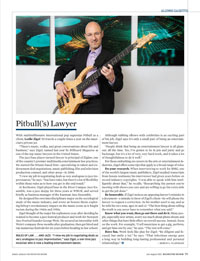Alumni Gazette
 RULES OF LAW . . . AND JAZZ: “I view my job in negotiating deals as very analogous to jazz improvisation,” says Zigel, a one-time jazz musician who is now a leading entertainment lawyer. (Photo: Daniel Azoulay for Rochester Review)
RULES OF LAW . . . AND JAZZ: “I view my job in negotiating deals as very analogous to jazz improvisation,” says Zigel, a one-time jazz musician who is now a leading entertainment lawyer. (Photo: Daniel Azoulay for Rochester Review)With multimillionaire international pop superstar Pitbull as a client, Leslie Zigel ’85 travels a couple times a year on the musician’s private jet.
“There’s music, vodka, and great conversations about life and business,” says Zigel, named last year by Billboard Magazine as one of the top music lawyers in the United States.
The jazz bass player-turned-lawyer is principal of Ziglaw, one of the country’s premier multimedia entertainment law practices. He started the Miami-based firm—specializing in talent and endorsement deal negotiations, music publishing, film and television production counsel, and other areas—in 2006.
“I view my job in negotiating deals as very analogous to jazz improvisation,” he says. “You have rules, but there’s a lot of flexibility within those rules as to how you get to the end result.”
At Rochester, Zigel played bass in the River Campus Jazz Ensemble, was a jazz deejay for three years at WRUR, and served briefly as business manager of the Eastman Jazz Ensemble.
He designed his own interdisciplinary major on the sociological study of the music industry, and wrote an honors thesis exploring bebop’s revolutionary impact on the music scene as it fought racism during the 1940s and 1950s.
Zigel thought of the major his sophomore year, after deciding he wanted to become a jazz festival producer and work for Newport Jazz Festival founder George Wein. He secured an internship with Wein’s company three months after graduation, then got hired and ran numerous festivals for six years before heading to law school.
Although rubbing elbows with celebrities is an exciting part of his job, Zigel says it’s only a small part of being an entertainment lawyer.
“People think that being an entertainment lawyer is all glamour, all the time. Yes, I’ve gotten to be in jets and party and go backstage, but it’s a lot of very, very hard work, and it takes a lot of thoughtfulness to do it well.”
For those embarking on careers in the arts or entertainment industries, Zigel offers some tips that apply to a broad range of roles:
Do your research. When interviewing to work for BMG, one of the world’s largest music publishers, Zigel studied transcripts from Senate testimony his interviewer had given years before on record industry copyrights. “I was able to speak with him intelligently about that,” he recalls. “Researching the person you’re meeting with shows you care and are willing to go the extra mile to get the job done.”
Be honorable. If Zigel notices an opposing lawyer’s mistake in a document—a mistake in favor of Zigel’s client—he will phone the lawyer to request a correction. As his mother used to say, and as he tells his two sons, ages 16 and 12: “The best thing about telling the truth is you never have to remember what you said.”
Know what you want, then go out there and do it. Many people, especially new artists, worry too much about photo shoots and other things that have little effect on overall success. Instead, focus on the work. For example, “I tell musicians to get a gig, perform, and get fans one by one,” he says. “The rest will come.”
Have fun. Work feels like play for Zigel. “Be diligent and focused, but smile a lot,” he says. “That infectious energy goes a long way in building long-lasting professional and personal relationships.” —Robin L. Flanigan.

